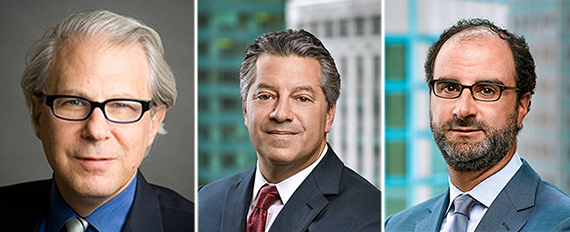SL Green Realty CEO Marc Holliday and president Andrew Mathias scored bigger pay packages in 2015, despite the real estate investment trust’s recent changes to its compensation program following shareholder feedback.
Holliday received just over $23 million in total compensation in 2015, a 40 percent year-over-year increase from $16.4 million in 2014. Mathias received $16 million, a year-over-year increase of 45 percent from $11 million. That’s according to a proxy statement the REIT released last month.
John Alschuler, chair of SL Green’s compensation committee and founder of real estate and policy consulting firm HR&A Advisors, said in an interview Friday that the REIT undertook a number of reforms that “strove for a total and complete alignment between the performance of the company and the pay earned by our executives.”
One step involved revising a compensation peer group of companies to remove “all New York City-based asset managers” – private equity players like Fortress Investment Group and the Blackstone Group, which paid CEO Stephen Schwarzman nearly $800 million last year – and focus more on SL Green’s “traditional REIT peer group,” such as Boston Properties, General Growth Properties and Vornado Realty Trust.
Performance-based factors, such as square footage of leases signed and funds from operations (FFO) per share, now make up a bigger chunk — 75 percent — of the annual executive cash bonus program, and will increase to 100 percent in 2016.
Those changes saw Holliday’s total cash and equity bonuses fall to $7 million in 2015 from $8 million in 2014, “primarily as a result of our disappointing short-term [total returns to shareholders],” SL Green said.
“Our mantra of pay-for-performance is not just empty words,” Alschuler said.
Like most REIT executives, most of Holliday and Mathias’ total compensation in 2015 consisted of stock awards that “do not reflect compensation actually received,” according to SL Green, and are disclosed in accordance with SEC regulations.
Alschuler noted that much of those awards are tied to the company’s “outperformance plan” and would require SL Green stock to significantly exceed its current share price. “Because our share price this year did not yield significant benefit to the shareholder” – SL Green shares opened trading Monday at $105.13, compared to a 52-week high of $124.68 – “we felt that we needed to make a reduction in the bonus to our chief executive,” he added.
In February, SL Green[TRData] agreed a new employment contract with Holliday which has a “three-year term with no automatic renewals,” according to the company, and features a reduction in long-term incentive plan awards as well as no guaranteed bonuses.
Executive chairman and company founder Stephen Green, meanwhile, earned more than $6.5 million in total compensation in 2015 – compared to $5.4 million the previous year – but also saw his bonus reduced last year. SL Green said that it expects to “further reduce annual bonuses paid” to Green in the coming years.
Last year, SL Green took stick for its compensation practices from corporate governance advisory firm Institutional Shareholder Services, which recommended that shareholders vote against the pay to be awarded to the REIT’s top executives and suggested “more strongly performance-based incentive programs” by the company.
Alschuler struck a defiant tone at the time, telling The Real Deal last year that his job is to “keep in place one of the top management teams in American real estate.”
And on Friday, while acknowledging that shareholders had requested a number of changes to the compensation structure, Alschuler said the REIT has always been careful with investors’ money.
“SL Green is a frugal company,” he said. “We have a much smaller executive team [than other REITs], and we compensate that executive team meaningfully because they deliver results. The shareholder, I hope, would be very respectful of our consideration for their costs.”
